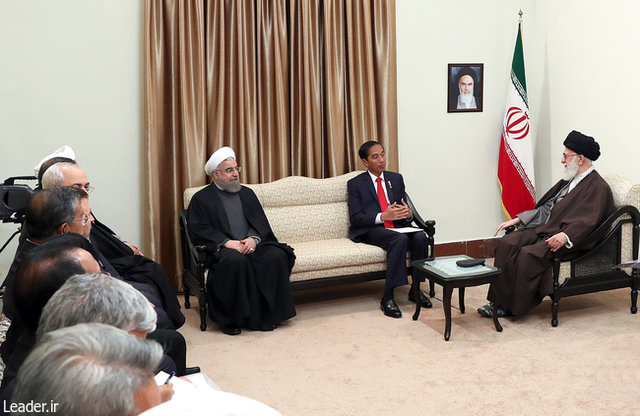Islamic countries must strengthen one another: Iran Leader

EghtesadOnline: Leader of the Islamic Revolution Ayatollah Seyyed Ali Khamenei stressed the need for Tehran and Jakarta to boost exchanges and cooperation in various economic, political and cultural fields.
In a meeting with visiting Indonesian President Joko Widodo on Wednesday, Iran’s leader pointed to numerous capacities of the two countries, stressing the need for Tehran and Jakarta to boost exchanges and cooperation in various economic, political and cultural fields.
According to ISNA, the Leader added that the Islamic Republic of Iran considers dignity and progress of Indonesia, as a Muslim and populous country, a cause of pride and honor for the entire Islamic Ummah.
Ayatollah Khamenei noted that the Islamic Republic’s approach to Indonesia is one based on brotherhood and cooperation and while referring to Indonesia’s good advances in various sectors, added, “The Islamic Republic of Iran also has numerous capacities in various sectors such as economy as well as underground and mineral resources, and we believe that, to the contrary of what their enemies want, Islamic countries must take steps to bolster one another and avoid discord.”
The Leader of the Islamic Revolution complained that the low level of economic exchanges between Iran and Indonesia was not proportionate to numerous capacities of the two countries and emphasized, “By determining [clear-cut] time intervals, the volume of economic exchanges [between the two countries] must increase to such figures as high as 20 billion dollars [a year].”
Referring to agreements and contracts signed between the two countries, Ayatollah Khamenei said, “Every effort must be made for these agreements to be translated into action and [practical] steps. Of course, certain parties are opposed to these agreements [between Iran and Indonesia], but we must overcome them through seriousness [in implementing bilateral agreements] and strong resolve.”
The Leader of the Islamic Revolution said contacts and interactions between clerics from Iran and Indonesia were auspicious and could lead to the establishment of continued cooperation between the two countries.
Elsewhere in his remarks, Ayatollah Khamenei said the ongoing conflicts in the West Asia region were imposed from the outside on the basis of external evil goals. Praising the positions adopted by Indonesia on the issue of Palestine, the Leader said, “Many of these [existing] crises have been created with the goal of causing the most difficult crisis in the region and the most important issue of the Islamic world, that is, [the issue of] Palestine, to be forgotten while this issue must not be allowed to be forgotten.”
The Leader of the Islamic Revolution also praised the prominent personality of Indonesia’s independence leader, Sukarno, and his role in founding the Bandung Conference, which became the cornerstone of the Non-Aligned Movement, noting, “Today, the political positions of Indonesia and the Islamic Republic of Iran in international bodies are close to each other.”
Referring to a recent earthquake in Indonesia, the Leader of the Islamic Revolution asked divine mercy and forgiveness for those who lost their lives in the quake while wishing patience and tranquility for their survivors.
.
During the meeting, which was also attended by Iranian President Hassan Rouhani, Indonesian President Joko Widodo expressed the interest of Indonesian people in the Islamic Republic of Iran while mentioning expansion of economic relations, especially in the field of energy, as the main goal of his Tehran visit.
He added, “We had constructive negotiations with the government of Iran and it was decided that in addition to investment in gas and refinery sectors, Iranian companies such as the MAPNA would invest in building power plants in Indonesia.
Widodo emphasized that such cooperation will open a new chapter in the two countries’ relations, saying, “The current level of economic relations between the two countries is not appropriate for two big Islamic countries and achieving a trade volume of 20 billion dollars [per year] is not impossible.”
The Indonesian president said in addition to the energy sector, other economic sectors such as tourism as well as scientific and academic exchanges were good areas for cooperation between Tehran and Jakarta. While expressing regret over instability and crises in the region, he added, “We believe that if Muslim countries were united, they would turn into a big and effective economic power.”
Widodo also reflected on the issue of Palestine, saying, “Indonesia considers itself committed to the issue of Palestine and we are serious and active in supporting the rights of the Palestinian people.”


